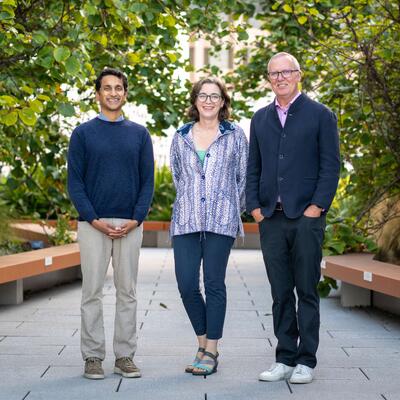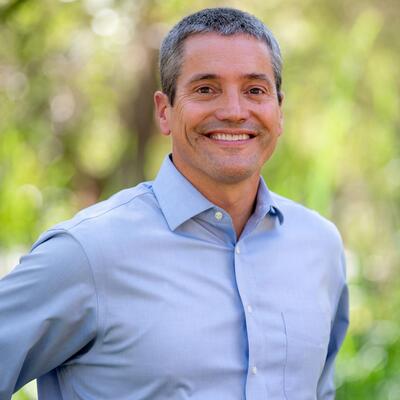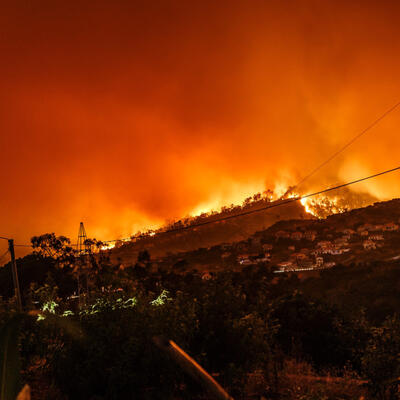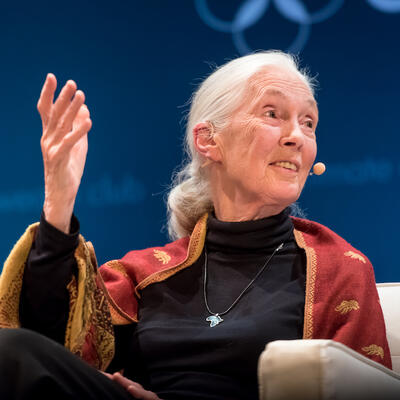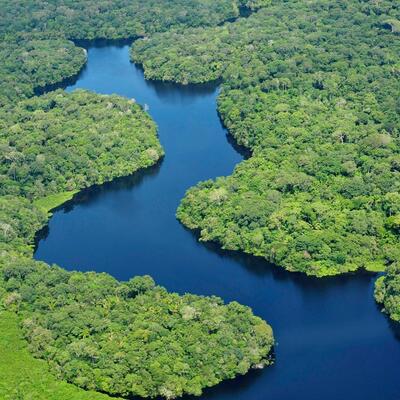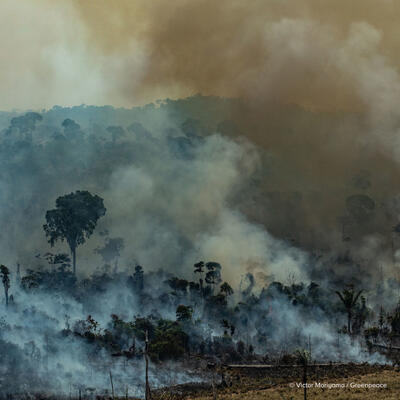
Scorched Earth: Culture and Climate Under Siege
Guests
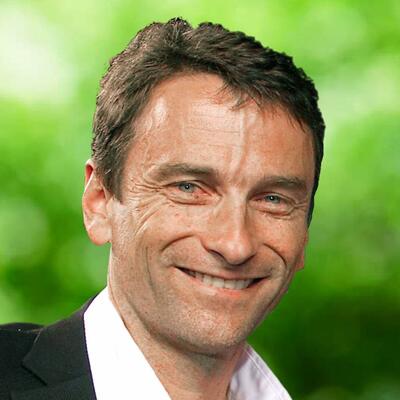
Corey Brinkema
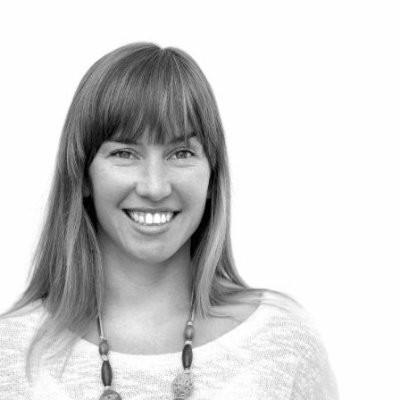
Tara O’Shea
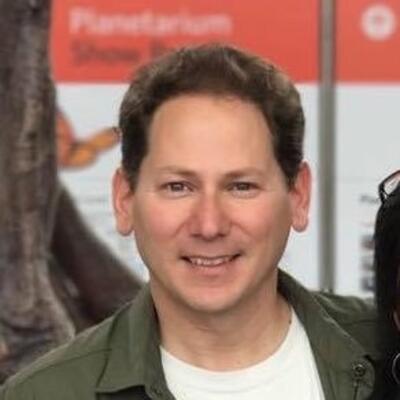
Paul Paz y Miño
Summary
This year has been one of record wildfires. From the Amazon to the Congo to California, forests are being decimated. And along with them, the stability of our climate.
But if a tree falls in the Amazon, will we hear it? Why should we care about trees that burn halfway across the world?
One reason is that global deforestation carries major implications for the climate: trees are among our most effective weapons against carbon emissions. The Amazon alone is responsible for removing five percent of the world’s forty billion tons of CO2 emissions from the air each year. When forests burn, carbon storage is lost, along with biodiversity, indigenous culture, and more.
But fire isn’t the only threat to our planet’s forests. Agribusiness, ranching, mining and global consumerism are just some of the dangers our trees face. And one of the leading culprits can most likely be found in your kitchen cabinets.
“Palm oil makes up probably somewhere between three and ten percent of pretty much every consumer good products that you're going to buy at the grocery store,” says Tara O’Shea of satellite imaging company Planet. “It is a leading driver of deforestation, especially in Southeast Asia, but increasingly in Africa.”
“We are at this stage because we've treated the earth like a resource to be exploited for profit,” says says Paul Paz y Miño of Amazon Watch.
“The forest is alive,” he continues. “If we don't treat it as a commodity, if we treat as a living thing like with another person essentially, then it elevates the level of respect that we have for it.”
Related Links:
Amazon Watch
Forest Stewardship Council
Indigenous Environmental Network
Forest 500 – Powerbrokers of Deforestation
H&M, VF Corp. Ditch Brazilian Leather Over Amazon Rainforest Fires (Huffington Post)
This program was recorded in front of a live audience at The Commonwealth Club of California in San Francisco on September 24, 2019.
Full Transcript
Greg Dalton: This is Climate One, changing the conversation about energy, the economy, and the environment.
Paul Paz y Miño: The forest is alive. If we don't treat it as a commodity, if we treat as a living thing like with another person essentially, then it elevates the level of respect that we have for it.
Greg Dalton: From the Amazon to the Congo to California, forests are being decimated. And along with them, the stability of our climate. Why? Because trees are among our most effective weapons against carbon emissions. But to solve the problem, we need to understand it on multiple levels.
Tara O’Shea: It’s really important not to think of these just as environmental issues. These are economic and development issues as well and we really have to have that lens when we look at the climate issue in particular.
Greg Dalton: Scorched earth: culture and climate under siege. Up next on Climate One.
---
Greg Dalton: If a tree falls in the Amazon, will we hear it
Climate One conversations feature oil executives and environmentalists, Republicans and Democrats, the exciting and the scary aspects of the climate challenge. I’m Greg Dalton.
Greg Dalton: Wildfires have been tearing through the Amazonian rainforest, as well as northern California and even Norway. Why should we care about trees that burn halfway across the world?
One reason is that global deforestation carries major implications for the climate. The Amazon alone is responsible for removing five percent of the world’s forty billion tons of CO2 emissions from the air each year. When forests burn, carbon storage is lost, along with biodiversity, indigenous culture, and more.
But fire isn’t the only threat to our planet’s forests.
Paul Paz y Miño: We are at this stage because we've treated the earth like a resource to be exploited for profit.
Agriculture, ranching, mining and our insatiable need for palm oil are just some of the dangers our trees face.
Tara O’Shea: Palm oil makes up, you know, probably somewhere between 3% and 10% of pretty much every consumer good products that you're going to buy at the grocery store. It is a leading driver of deforestation, especially in Southeast Asia, but increasingly in Africa.
Greg Dalton: On today’s program, we’ll talk about the climate factors and the global consumerism driving deforestation, as well as the seeds of change being planted by organizations, corporations and governments.
Joining me on the Climate One stage are Paul Paz y Miño, associate director at Amazon Watch, an environmental group that advocates for the rights of indigenous people, and Tara O’Shea, director of forest programs of Planet, a San Francisco company that builds and operates satellites that image the Earth's surface every day.
Joining us remotely from his office in Minneapolis is Corey Brinkema. He’s president of the Forest Stewardship Council, or FSC, an international nonprofit that promotes responsible management of the world's forests.
The Amazon used to be one of the few positive climate stories. I remember attending the International Climate Conference in Cancun in 2010, where Brazil’s president Lula da Silva said deforestation was the lowest in two decades. Brazil was an emerging climate leader.
Paul Paz y Miño brings us up to date.
Paul Paz y Miño: Yeah, well first I would say that’s true to a great degree. However, at the same time, there were still and still remain challenges for the rights and protections of territories of indigenous peoples even when deforestation rates were decreasing. And as an indigenous rights and environmental organization that’s something that always comes first when we’re looking at the situation. However, it's true that with a lot of pressure and a lot of international focus and global attention we were moving in the right direction. Brazil was moving in the right direction. Deforestation was down. Monitoring of deforestation was down and the pressure on illegal loggers and mining, etc. was increased. And so agencies that were monitoring it like IBAMA, for example, which is Brazil’s environmental protection agency were able to target and even destroy machinery that was involved in deforestation until the current regime and things have shifted drastically in the last few years.
Greg Dalton: So Tara O’Shea. Explain the fires that were in the headlines earlier in 2019; where were they, what was causing them, kind of refresh us on the basics here.
Tara O’Shea: Yeah, you know, I think it’s really important to note that the fires that happened and are happening at this time in the Amazon basin the majority of which are on lands that were cleared this year. So it’s sort of different from how we think of wildfires here in California or in the global North where it tends to be from a build up of biomass. There’s a lot of pressures as we just heard in Brazil to clearly for agricultural production and that's typically done in a kind of slash and burn process. And that’s actually what we’re seeing now. And we’re seeing it in the data; there’s increase amounts of forest clearing and there is unprecedented amount of forest fires.
Greg Dalton: Unprecedented. So there was some debate really actually that it was about whether this was really larger magnitude fires or whether it was just more increased attention to them. So if you look over the last 10 years there’s some debate whether these fires are really that more than last year but give us the historical context, were they really as bad as they were portrayed to be?
Tara O’Shea: Yeah, you know, I do think it's twofold. I think transparency has increased and you see that not only with advances in earth observation technologies but also sort of just access to media. But that being said, t it is more and it's more than the historical baseline that we’ve seen and sort of both of those factors are increased, both the clearing as well as the fires.
Greg Dalton: Okay. Corey Brinkema, your origin story for your organization actually dates to Rio in 1992. Tell us of that connection.
Corey Brinkema: Sure. So the Forest Stewardship Council really grew out of the failure at that Earth Summit in Rio in 1992 where governments were coming together in part to tackle, especially tropical deforestation. And without any compacts or major agreements at the conclusion of that summit I came to some of the activists and other members of civil societies and progressive corporations and others who bonded together and look essentially for a nongovernmental, nonregulatory solution. And from those kind of early beginnings our certification system FSC was born and we’re celebrating our 25th anniversary and yeah it’s obviously unfortunate time I think in the place of our origin in Brazil.
I think one thing is important to recognize in terms of statistics out there. I mean I think the rate of deforestation in a more recent times here preceded this current president. I think we saw some great progress from probably 2004 to 2012 or so. And then with the recessionary impacts and corruption in the government I think some of the ability of the government agencies there to police the laws that were on the books began to decline and then obviously with this current administration we’ve seen I think in the last year deforestation rates by several accounts increasing twofold from just last year.
Greg Dalton: Tara O’Shea, are forests more at risk when the economies are good or bad or both?
Tara O’Shea: I think it’s a mix of both. And I think, you know, it’s a really important point because I think we have to think of economic incentives around forest, right. Many forests, many of these sort of remaining tropical ecosystems are in developing economies. There’s a lot of pressure for economic growth and, you know, in many places the economic incentive is such that it's more lucrative to use land for agricultural production than it is to maintain a forest ecosystem. And I think you see that at play, you know, in terms of soy in Brazil or palm oil in Indonesia. And that's really often at the root of the problem. And so you have to think of it as a global issue it’s certainly linked to global trade.
Greg Dalton: And how global trade has been disrupted recently you may have noticed. And how is the tariffs and the trade with China affected Brazil?
Tara O’Shea: Yeah, I think it’s, you know, that’s a really timely question. I think it was in March of this year there was a group of researchers out of Germany, Richard Fuchs and colleagues there. And they actually sort of said that the amount of export, soy export from the U.S. to China was down 50% due to our tariff war. And they modeled and predicted that Brazil might need 39% more land in its soy production in order to match demand coming out of China. And so those are just really strong incentives and that was a publication in March of this year really is forewarning in some ways. But again, it’s really important not to think of these just as environmental issues. These are economic and development issues as well and we really have to have that lens when we look at the climate issue in particular.
Greg Dalton: Paul Paz y Miño, there’s been some push back from Brazil for sort of the global North sort of American saying like what they ought to do with their forest. Imagine if some foreign country told us what we ought to do with the forest in the Pacific Northwest, right. So tell about the sort of the overlay of I don’t know colonialism or patronizing toward these Latin American countries.
Paul Paz y Miño: Well, first I think and the other thing to add about the misperception about the fires is the direct attack that many of them were on indigenous territories over 9,000 fires set this year on indigenous lands in the Amazon, the Brazilian Amazon, 5,000 of them in August. So this was area that was cleared prior illegally on indigenous territory. And now that land is burning. There's a deliberate and direct expansion and as indigenous committees of Brazil see it, attack on them. And that's where I find it outrageous that Brazil would have the audacity to suggest other country shouldn’t tell them what to do with their Amazon when they're literally killing the indigenous people who have been living there for millennia. It is areas that they have stewarded on behalf of essentially of everyone on the planet and Brazil is saying you shouldn't tell us what to do. I mean, Bolsonaro said today at the United Nations the Amazon isn’t burning, indigenous peoples don't wanna be poor. They want to exploit the land. We’re living in essentially the Trumpian area of Brazil where the truth has no connection to what people actually saying. And the ones suffering and the ones who are on the front lines of this battle.
Greg Dalton: Tara O’Shea, tell us about the link between Paris and protecting forests.
Tara O’Shea: Yeah, forests are a big part of the Paris climate accord. So through article 5 of the Paris climate accord developing countries can receive performance-based payments for conserving forest. And again this has been a lot of work throughout the international community probably 12 years of negotiations to establish these sorts of frameworks and measurement systems. And again, it really gets at getting at that root problem around how can we create a pathway to a more sustainable model for economic development. And so through this process you have about 64 countries that are eligible for performance-based payments. Planet actually just began working with some of those measurement and verification systems at the United Nations. So it’s a really important piece and again, it's a big part of the climate puzzle, right. We’re looking at about 23% of emissions coming from the land sector. So we really need these nature -based solutions not only for the climate but also for these numerous other benefits as well.
Greg Dalton: And so can Planet actually verify because there’s lots of concerns about forest programs. Somebody gets paid to keep a forest intact and like, okay, what happens when someone turns their back or they got the money. Can you actually monitor that over time to make sure that those countries are protecting the forest in a way that they’re getting paid to do?
Tara O’Shea: Yeah, that’s a really important question. There are very robust what I would think of is methodologies around, you know, how do you measure these things. How do you prove that they are additional to historical baselines that they’re not creating leakage. Sort of at the community and jurisdiction level the verified carbon standard provides some third-party audits within the UN process itself. There are what’s called MRV, measurement reporting verification systems. These all use a combination of satellite data and ground data. Essentially what they're looking at is forest area change compared to a baseline and they multiply that change according to a carbon coefficient. So at Planet data, as you mentioned in the beginning we are now imaging the full earth every day at about 3 meters per pixel. So it's sort of an unprecedented data set in terms of spatial and temporal resolution. So we are really focused is providing a new data set into that forest area change estimation. So in short, yes, our data is very helpful in making us more accurate.
Greg Dalton: Paul Paz y Miño. The California has a new tropical forest standard and the ideas that people can achieve some savings or California companies can get some credit by protecting a forest somewhere else. This is I believe is proposed you got some problems with it.
Paul Paz y Miño: Yeah. We have a lot of problems with it. We’ve brought many indigenous leaders up to engage with the board before that moved forward.
Greg Dalton: This is the California Air Board which just started to implement this.
Paul Paz y Miño: I mean the bottom line is that we are here working to protect the environment on behalf of everyone who lives on the planet. Nobody gets more of a right to enjoy that than someone else. And what we and our indigenous allies would call that is a scheme to essentially allow one to pollute somewhere and harm someone, usually communities of color in order to benefit somewhere else. And there are other ways to go about protecting forests.
And so we've seen leader after leader come up and explain this is the system that put them in the place that they are have to challenge and fight for the right to exist and protect their forest. So by California doing that and my hope is that the governor will not proceed with that and it will not become a policy that we use as a state; there are so many other things we can do that would actually protect forests instead. And so we would label that a false solution. And I think because the kind of organizations we are we take the lead from the indigenous communities we’re on the front lines first. The Indigenous Environmental Network, Tom Goldtooth said had plenty about why the tropical forest standards that perpetuation of the system that has repressed indigenous communities in the United States and elsewhere for generations.
Greg Dalton: Almost a decade ago the consumer goods form a global consortium of major retailers and manufacturers pledged that their 400-member companies would achieve zero deforestation by 2020. As that date approaches they are not even close. Sarah Rogerson works with Forest 500 project which tracks how large companies and financial institutions are linked to deforestation.
[Start Playback]
Sarah Rogerson: We focus on tropical deforestation. So we’re looking at Latin America, Southeast Asia and some parts of Africa as well. In our assessments from last year in 2018 we actually only awarded the top score to two companies which are Nestle and Kao Corporation. So it’s a few leaders and there are still many consumer members who haven’t even began to try and tackle the deforestation that they’re exposed to. We looked at the companies that are in the Forest 500 and part of the consumer goods forum and one fifth of the set of companies overlapped between those two samples, still hadn’t set their own commitments. And there’s definitely a lot of companies who have written up commitments and said that they’d be acting on it. And not began to implement it and not making any progress. We cover palm oil, soy, timber and paper and beef and leather. Beef and leather companies have always lagged behind in terms of setting commitments and promising to tackle the deforestation that they’re exposed to. And cattle drive the most tropical deforestation globally so that’s quite a big gap.
The reputational risk of being linked to deforestation is what is moving these companies to make this announcement. They know they need to do it and there's plenty of guidance out there now with the accountability framework initiative and there’s so many tools. There really isn’t any excuse for companies not to be acting.
[End Playback]
Greg Dalton: That was Sarah Rogerson who leads the Forest 500 project at Global Canopy, a nonprofit organization based in England. Corey Brinkema. I’d like to get you on that. That was a voluntary corporate effort that failed to meet its voluntary targets. Does that suggest that corporations need more pressure than just their own voluntary goals?
Corey Brinkema: Sure. Sure. And unfortunately, yes. Our history at FSC has born that out. I think it's fair to say that many of the kind of early stage companies that got involved in certification, you know, came to FSC largely as the result of campaigns by activists, you know, the Greenpeaces of the world and Rainforest Action Network, Stand, used to be ForestEthics. Now there are campaigns by Natural Resources Defense Council and others that are putting pressure on companies and generally, you know, that's what it takes.
We’re unfortunately at a stage at least here in the United States where consumers aren’t necessarily demanding these things. And so civil society generally in the form of environmental and social activists have needed to step it up. But what we have seen is, you know, we've seen certain companies I think I just mentioned there the up and H&M in the U.S. we’re seeing some real progress of companies like HP and Kimberly-Clark and P&G who frankly do source quite a bit of fiber pulp from Brazil. And they are taking what perhaps may have been a bit of embarrassment in the marketplace as a result of that activism and turning it into really positive developments and taking advantage of what now is becoming some leadership in this area.
---
Greg Dalton: You’re listening to a Climate One conversation about ways to combat world deforestation. Coming up, retailers flex their buying power against bad actors in Indonesia and China.
Corey Brinkema: And that pressure, you know, essentially I mean more or less I guess you’d call that a boycott as well has had a significantly positive impact in some cases, almost stopping that deforestation in its tracks.
Greg Dalton: That’s up next, when Climate One continues.
---
Greg Dalton: This is Climate One. I’m Greg Dalton, and we’re talking about the importance of protecting forests, both far and near. My guests are Corey Brinkema of the Forest Stewardship Council, Tara O’Shea of the satellite imaging company Planet, and Paul Paz y Miño of Amazon Watch.
Several large companies, including H&M and VF, the parent company behind Timberland, Vans and North Face, have sworn off sourcing materials from Brazil as a result of the Amazon fires intentionally set to clear the land. Paul Paz y Miño calls that...a good start.
PROGRAM PART 2
Paul Paz y Miño: Yeah, that's fantastic. That should be applauded and other companies doing the same thing should be encouraged and patted on the back when they do. The challenge though is that it's really the financers behind the companies the BlackRocks, the State Streets the Vanguards who are the largest players when it comes to deforestation and they are not doing anything at all. They are talking the talk. Larry Fink the CEO of BlackRock, today we delivered hundreds of thousands of petitions in New York and representatives from indigenous nationalities in Brazil went to say we came to your shareholder meeting in May. We told you that this was going to happen. BlackRock is the number one investor in climate change in the world in coal and gas and deforestation in Brazil. And you have the power the actual power to make a huge change when it comes to this, he was disregarded. In fact, the representative from Brazil was the only shareholder or speaker that Fink ignored during that shareholder meeting.
And as Amazon Watch posted in the New York Times op-ed in January this is what was coming. We said Bolsonaro wants to plunder the Amazon, BlackRock is helping them do it. We have to step together to stop it from happening. And now here we are in September and the Amazon is on fire twice as much as it had ever been before. So the challenge to, you know, it's great if certain companies will do that and we need to pressure them to do it. But we've reached another level of urgency here not just for the climate for the people who are suffering it and the targets of the people that we know we can have the power to make a difference.
Greg Dalton: Some environmental groups though say that boycotts are not an effective way to pressure Brazil or other governments. Elizabeth Sturcken works with large companies as managing director at the Environmental Defense Fund.
[Start Playback]
Elizabeth Sturcken: When companies like Timberland and North Face say they’re gonna stop sourcing from a region like the Amazon, I think it sends a powerful signal but it’s not a solution. I think it's a band-aid and it's not getting at the core lever of change. One of the best ways to create change is to use purchasing power; companies buy a lot of products from the Amazon, beef, soy, pulp and paper those are the important commodities that drive the economy. If you want to create the change, you have to go where the power lies.
Boycotts are great for calling attention to an issue. For years we saw that McDonald's had a policy that they would not purchase beef from the Amazon and from Brazil. And that meant that they didn't have to deal with the problems and the issues that were arise in the Amazon. Instead, I think they've taken a much more powerful and change making position by saying no. They’re gonna engage in the Amazon and they're going to approach it in what EDF believes is the right way, which is called the jurisdictional approach. It means looking at a particular region and engaging with the governments there in a very holistic way. It's a way that supports the company's goals of a strong supply of products but it also supports indigenous rights and also supports the agriculture industry in a place like Brazil. It’s the kind of power and change that is needed to get us where we need to go on this issue.
[End Playback]
Greg Dalton: Elizabeth Sturcken is the managing director at EDF where she works with large companies including Walmart and Tyson Foods and has worked with McDonald's in the past. Corey Brinkema, your thoughts on that. She's advocating constructive engagement; you need to be at the table part of these things and that’s what you do.
Corey Brinkema: It is. It is. I do think there is a role for boycotts though, and I think often boycotts need to precede that engagement. At the very least saying, listen we’re gonna stop sourcing until we see some of the change that we’re seeking in the supply chain. So yeah, obviously FSC has led the way with respect to certifying forests to a set of standards that social and environmental interests activists including indigenous peoples, groups, labor, local communities, small holders, environmental NGOs have work together with economic interest to devise a set of standards, globally consistent set of standards, that all believe are achieving the objectives that each of the interest group is looking for. And it’s definitely a balanced approach; it’s absolutely not the necessary the highest standard that any one group would necessarily arrive at. But in our world now we have I think some 500 million acres of certified forests and 38,000 companies participating in FSC. I think we’re at about roughly 20% of the global trade in Roundwood.
So we’re still have a ways to go but you know, we’ve proven that a solution like this can have real impact. But I think one of our challenges in Brazil, in particular in the Amazon is that most of the certified wood and fiber coming out of that region is in the form of plantations that are largely on lands that were deforested 50 years ago and it's mostly what used to be the Atlantic forest. And so what we essentially have done is create a platform for that engagement for companies that want to purchase from Brazil to work with local companies, with local stakeholders, and identify the solutions that we’re seeking on the ground there. And what that's resulted in and in fact Brazil our standard is slightly varied because there’s recognition that because of that historic forest loss in the Atlantic region that it's important to do restoration. So our standards, even though we’re certifying plantations largely down there we’re asking for 20% of those lands for any given holding to be restored to natural forest conditions.
Greg Dalton: If you're just joining us, Corey Brinkema is president of the Forest Stewardship Council. Other guests today are Tara O’Shea, director of forest programs at Planet, a company that operates low orbit satellites that image the earth’s surface every day. And Paul Paz y Miño, is associate director at Amazon Watch, an environmental group that advocates for the rights of indigenous people. I'm Greg Dalton.
We’re really talking around, we’re kind of dancing around the question of capitalism here. Tara O’Shea, capitalism is part of the problem. Do you think capitalism needs to be replaced reformed because really it's the economic drivers of here of our retirement plans our consumption that are driving these things we’re talking about.
Tara O’Shea: I think it needs to be drastically reformed and informed. I think that capitalism can measure risks if it's informed on the reality of those risks and right now it is totally excluding the reality of environmental and social risk to the detriment of many of the most vulnerable populations amongst us. And so I do think there is a pathway whereby if we can more cost-effectively and practically measure the reality of global change then we can more proactively account for it in our economic decisions, transactions. I think you’d see, you know, we mentioned here these are really complex problems. And many of these companies that have signed up for these targets they're not necessarily incentivized to solve it even in their own supply chain yet. And it’s really getting to the root of those incentives and that's the way we need to be focusing our solutions.
Greg Dalton: I often say if you put Bill McKibben in the charge of a big oil company he’d last about a week. Because he would do things and the shareholders would throw him out and the shareholders would be people that everyone listening to this may be invested in through their retirement plan or their parents are. So they're playing by certain rules and I guess what you're saying Tara is you need to change those rules. Paul, do you think that capitalism needs to be overturned or can be reformed to address these harms?
Paul Paz y Miño: It's probably no surprise that I don't think it's the solution. We are at this stage because we've treated the earth like a resource to be exploited for profit. And the only way to get out of that from my point of view and I believe from the perspective of many of the communities that we work with is if we’re not looking at it like a line to an end. But we have a holistic perspective on what value there is in, for example, a tree as a tree, not as something that can be tagged as this amount of carbon sequestered or oxygen produced but the value in it of itself, the living forest. And that is pretty directly in contradiction to any capitalistic model for how we can basically pay ourselves out of this mess. We’ve allowed these corporations for so long to externalize all of the negative impacts of what they've been doing. And now we’re reaping the benefits of it, and to turn back and say we’ll work out with you a way to do it that doesn’t hurt so much is preposterous to me.
We’re on the edge of a cliff and the capitalist perspective would be let's inch our way up little by little and we’re gonna end up falling no matter what happens at that rate. It’s like if you heard Greta talk at the UN that's the kind of passion I think we need from everyone to fight back against that kind of perspective because radical change is necessary. And these fires in the Amazon are actually waking people up to the danger of that and the need for radical change now. Because it's one thing to talk about yes, we have to stop burning fossil fuels, which is true and drastically. But they don't, it’s not as visceral a reaction as you see what essentially is the lifeblood of our global weather system burning away every moment that we don't do anything to stop it and other people are setting more fires while we talk about it. So I don’t have the answer to okay capitalism isn't perfect and here's what we do, but I know that's not the solution. And if we want to sit and talk about ways that it could be I think in the meantime we’re spending all the time we have left to really deal with the problem.
Greg Dalton: Belief in incrementalism is some form of denial, right?
Paul Paz y Miño: Yeah. It’s 2019.
Greg Dalton: Tara O’Shea, I want to switch to the Congo as an area we haven't talked about, we’ve been talking a lot about the Amazon the Congo is an area where there is, tell us, you know, the forest there coming out of conflicts some interesting things are happening.
Tara O’Shea: Yeah, I think in many ways the Democratic Republic of the Congo is a success case right now in terms of forest conservation. It’s important to look to those optimistic places as well I think. The DRC is one of the first countries to receive performance-based payments through the Paris mechanism through the World Bank Forest Carbon Partnership Facility. Mozambique and Indonesia also receive performance-based payments this year. And I think the DRC is an interesting case because it sort of demonstrates the possibility of a new model for economic development, right. So the DRC is coming out of a prolonged period of conflict which, you know, led to a very low amount of engagements and development in the country and it's coming into more stable times. And so they're looking at how do I invest in my economy how do I grow how do I manage my resources. And they’re doing that in concert with sort of these new international programs that are designed to incentivize a more sustainable and green pathway to allowing your population to develop. And I think they're doing a pretty good job at that and more importantly they're being rewarded for it. And I think that that's really critical.
Greg Dalton: Corey Brinkema, other bright spots in the management of forests around the world. We always hear about deforestation in Brazil, Indonesia. Where are some things managed it well?
Corey Brinkema: Sure. Yeah. Maybe touch again on the Congo base and we've seen some recent moves just even in the last year. The president of Gabon, announcing that all of their concessions essentially, if you're a company that wants to demand forest for forest products that you would have to be FSC certified in order to do so. So that’s some real I think leadership on their part, we’ll see if we can sustain that. But that’s exciting for sure.
You know, I think another area all these places are still fraught with risk and are still significant illegal logging and threats to indigenous people and other local communities but certainly in Southeast Asia and Indonesia, specifically another place where there are significant fires and tropical deforestation. But, you know, we've seen what pressure from the consuming countries in the form of companies basically saying, you know, retailers in the United States saying, we’re not gonna buy tissue or paper products from companies like Asia Pulp & Paper and APRIL to very large Indonesian/Chinese corporations that have up until fairly recently, have been serial deforesters. And that pressure, you know, essentially I mean more or less I guess you’d call that a boycott as well has had a significantly positive impact in some cases, stopping that deforestation in its tracks. And again we got to hold these companies accountable, you know, go forward. They still are highly imperfect but again we see them now considering the possibility of certification wanting to play nice I guess with some of their major customers in places like the U.S. and Europe and Japan.
Greg Dalton: Paul Paz y Miño, the New York Times, The Weekly which is a new TV show that kind of took the daily into video. Did a fabulous piece on gold-mining and gold-mining is really one of the untold stories and drivers of deforestation in the Amazon and gold is in all of our phones. So connect those dots for us.
[00:42:43] Paul Paz y Miño: Well, gold-mining throughout the Amazon, a lot of which is in Peru too. And there’s a challenge not just for gold, we haven't talked about mining much at all. There’s the lumber there’s other products we’re talking about cattle but mining is a massive driver of deforestation. And we’re going to rely on mining to have the new technologies that we also need to move off of fossil fuels. So there's a challenge there too. I feel like with everything that we’re talking about a rights-based approach to dealing with all of it is actually the most effective not only just but most effective way to handle it whether it be mining or any of these causes. And it's actually been shown that the best way to protect forests is to enable the rights and advance the rights of people who are protecting it.
So when it comes to mining there can and may have to be a way to find a way to produce it so that we cannot harm communities and the environment but get to the minerals that we’re actually going to need. Now, gold-mining, you know, obviously there are certain elements of it that are important for some of these technologies and there are other uses of it that really don't benefit society.
---
Greg Dalton: You’re listening to a Climate One conversation about protecting forests. Coming up, indigenous people on the front lines.
Paul Paz y Miño: They’re at the front of every march; they are welcomed and their voices are enabled as the first ones to be heard from because they literally are the front lines of this fight.
Greg Dalton: That’s up next, when Climate One continues.
---
Greg Dalton: This is Climate One. I’m Greg Dalton. We’re talking about climate change and deforestation, with Paul Paz y Miño of Amazon Watch, Corey Brinkema of the Forest Stewardship Council, and Tara O’Shea of Planet.
What’s one of the biggest drivers behind the planet’s disappearing forests? Tara O’Shea says it can very likely be found right in your kitchen cabinets.
PROGRAM PART 3
Tara O’Shea: So palm oil makes up, you know, probably somewhere between 3% and 10% of pretty much every consumer good products that you're going to buy at the grocery store. And so if I’m Unilever I’m producing thousands of consumer goods products each one of which is 3% palm oil. It’s very difficult to trace down. It is a leading driver of deforestation, especially in Southeast Asia, but increasingly in Africa. I think especially in Western Africa it just exploded and I think in some regions of the Amazon now as well.
It’s a difficult challenge again because of the supply chain management. I will say we’ve been doing some great work with Global Forest Watch for example, which again because Planet data is kind of that higher spatial resolution. You cannot only detect when something goes from forest to non-forest. You can actually pick up the spatial signature of what’s happening on the ground. So to give you, Planet at 3 meters per pixel you can see a building not a car type of thing. So if a forest is cleared for palm oil it’s very neat rows. And so using our data we’ve done some work with Global Forest Watch to actually build a system that can detect automatically when forest in Indonesia is converted into palm oil. But again, it's a question of you know, we’re sort of waving our hands saying hey we can do this and we need the rest of the global community to work with us and apply it. It’s not a silver bullet on its own.
Greg Dalton: Paul Paz y Miño, one of the approaches to this sort of thing is to cordon off an area of forest and say, this is a National Park. In fact, North Face, one of the founders of North Face he did that with thousands of acres in Chile, right. Tompkins Conservation effort to basically sort of protect nature. What are the problems with that approach to try to rope off forest or other areas for conservation permanently?
Paul Paz y Miño: Well, I think Sierra Club could talk about what the Trump administration is doing to protect areas in the United States and have a whole panel just on that discussion. And the same thing in Latin America in Yasuni National Park, the most bio diverse part of the Amazon, which is now being drilled for oil by the Ecuadorian government after years of campaign to protect it. And it's the home to many indigenous communities including isolated communities in voluntary isolation. So one day it’s a park, the next day it’s an oil field and that’s not gonna cut it.
Greg Dalton: Right. And in terms of the indigenous people I'm just thinking again about we mentioned them, most people don't really interact with indigenous people don't talk to them even in our own country. So tell us a little more about who these people are. We have this label but this image of someone who's “primitive.”
Paul Paz y Miño: Right. Right. Well, one of the most I think encouraging things about the climate movement in the last few years is that indigenous communities are at the front of those messages. They’re at the front of every march they are welcomed and their voices are enabled as the first ones to be heard from because they literally are the front lines of this fight. But, you can't just fall into, you know, stereotypical images of what it means to be an indigenous person. I mean right now, Sônia Guajajara, who is one of the leaders of her community in Brazil, and is the head of the National Association of Indigenous People of Brazil ran for president is in New York challenging Bolsonaro directly. And of course, he's making racist attacks against her. She is a very sophisticated and well organized powerful advocate for the rights of her people and for Brazil as a country. She ran for president because she wanted to be president of Brazil. Not just someone who's looking over her indigenous territory.
So, they’re very much is certainly in Brazil and in other countries a part of the culture in the country they’re part of. But, also they bring in many cases an additional perspective of the length, and the stewardship of the forest that is needed in order for us to actually survive the climate crisis. And, you know, obviously putting people on a pedestal is always a challenge, you have to work with them and treat them with the same level of respect as anybody else. But, the answers that we are seeing as organizations working on indigenous rights and environmental issues that come from indigenous communities, seem to us like the ones that are actually viable alternatives to make it through this crisis. And really that's the stage where at right now.
There are a lot of solutions out there. But, we’re at the precipice essentially, you know, and we have to look at what's the most critical thing to focus on right now. Bill McKibben after Bolsonaro was elected said, the fight to preserve the Brazilian Amazon is the most important environmental fight period right now. We’re up against that. So, if indigenous leaders they are the most effective ways to protect it, we have to get behind them.
Greg Dalton: We’re gonna go to our audience questions invite you to join us over there at the microphone with one, one-part comment or a question. Welcome to Climate One.
Male Participant: Alright, thank you. My name is Johnny Fuh [ph]. I’d like to know, living more about what you mean by indigenous solution. And I think that's something you’ve been advocating and it's better than let’s say like new forestry standard that’s in vogue. What’s the local solution look like?
Paul Paz y Miño: So many of the indigenous communities we work with throughout the Amazon have what some people refer to as life plans. Or in the case of Sarayaku for example in Ecuador they call it “Kawsak Sacha” or living forest. Which is not only a permanent protection of the Amazon but and the region where they live. But an understanding of the relationship that the forest is alive. If we don't treat it as a commodity if we treat as a living thing like with another person essentially, then it elevates level of respect that we have for it. And we’re not having a debate about should this area be cordoned off and used for imagine like this arm is gonna be used in some economic endeavor. It's your arm, you’re not gonna have that kind of discussion. So when it comes to indigenous solution there’s a fundamental shift of the way we see these natural resources and how we interact with them. And my point about capitalism earlier is, because we've gotten so far away from that we’re now in a dangerous position that we are. If we had approach more similar to that years ago, we wouldn't be having these discussions. We would've realized that the direction we’re moving in is gonna put our very existence on the planet in jeopardy.
So when it comes to those solutions it's actually, identifying those life plans getting behind the communities that are advocating for them. And then replicating them elsewhere locally, you know, even in places that have been developed like the United States. There are many indigenous communities who are still active in organizing here right in San Francisco. And their attitude about the way we look at the effect of our participation in our economy and in the environment with the Chevron Richmond Refinery for example and expanding that, what that means for jobs. Never letting go of the issue of what is the impact it’s gonna have on our relationship to the environment here and the people who live in Richmond. So that has to be an element throughout everything that we do. And that’s what I would think of as an indigenous perspective.
Greg Dalton: Let’s go to our next question. Welcome.
Male Participant: Hello. I'm Darrell Kenyon from bucolic Carmel Valley. I feel that a lot of people now want to cut out a little slice of their life to explore this and how can they positively participate. And it seems like the deforestation issue is something that has such a wide reach, like what can you do to contribute positively. Wondering what input you might have in terms of the more global perspective of the situation.
Greg Dalton: Yeah. Thank you. Because we’re talking global forest there’s lot happening here in the United States locally. Who’d like to tackle maybe Corey you want to tackle the local forest?
Corey Brinkema: Yeah. Yeah, you know, that’s a fantastic question. And I like that sort of I mean, you know, this is where you need to act locally and globally. You know, I think we've touched on the primary drivers, especially for what's going on in Brazil right now. Commodities like beef and soy and to some extent forest products as well. Yet, we collectively need to demand more responsible sourcing by these industries that basically take the exports from Brazil. And I don’t know if the solution for example, in beef and soya some sort of certification as well, but, certainly a set of standards. You know, an absolutely minimum set of standards and hopefully some that we can see, you know, whether they’re small, there’s others be able to improve over time.
But, when it does come to forest products, I mean FSC is offering that solution for responsible forest management. And covering right now, a pretty wide array of products from, you know, typical timber wood, paper products to, you know, things you wouldn’t necessarily realize that come from a forest like rubber and now even fabrics being made from forest fibers. So, I think it's really important that we choose to buy responsibly and really encourage the companies that make our products to do that on our behalf.
Greg Dalton: So as we wrap up here, let’s end up on an upbeat here. What do we see Paul, you know, what do you see as some bright spots. Whether protection of indigenous people or forest, you know, bring us home on an upbeat.
Paul Paz y Miño: Well, okay, I'll do my best
Greg Dalton: It may not be in your nature but try.
Paul Paz y Miño: I mean, so, right now in the last month to be totally frank, I’ve work every single day usually 12 to 14 hours at Amazon Watch it has not stopped for an instant because there's so much more attention. Like we feel the anxiety of we must capture this moment and make sure it never goes back to normal, this is the new normal. And the reason being that the people who are contacting us are feeling like my life and my family is at risk as well as the Amazon, what am I gonna do? What can I do? They don't just send money, they want to know how they can donate. I mean how they can donate their time, how they can volunteer, who they should be calling. We all can be and in my view has to be climate activist. Learning about stuff is great we need to educate ourselves. But if we’re not acting at the same time, it's not gonna make a difference, it's too late. We have to decide.
Okay we’re in university now, that we’re gonna sign up for the classes, maybe we can specialize whether it's satellite imagery, whatever our specialization is gonna be. But it's gonna come with action and it's gonna come with engagement. So, if you're not supporting an organization that’s doing this work voluntarily or by donating. If you're not engaging in your local community to find out about things like the tropical forest standard in California. There are local actions that will affect global decisions and impacts on people halfway across the globe. Now we know the positive thing is we know we can do those things, we know they're effective. And there's a whole group of people out there organizing action to make it effective. We’re gonna pressure BlackRock until they change. And, now you can find out how you can be a part of that, and join that pressure and know that it's gonna make a real difference. Before, you might've thought I don't know, I can make a phone call, but is that gonna be enough? No. There's a campaign, so support the people that are doing it.
My son is 11 years old. Two months ago I had a conversation with him, you know, what are you gonna be when you grow up? And it was a both a bittersweet thing because he said, well I got to be a climate activist because what's the point of doing anything else. And now of course, he's my son, so hear this stuff a lot but he gets that there’s nothing else to do right now if we’re not gonna make a change here.
So the positive thing for me is people are doing it in a way they've never done it before. It's not quite enough, yet. But, look at yourself it’s not just what you eat or don't eat or what you drive or don't drive. It’s where are you engaged and how are you engaging other people to do it. Now's the moment to see to get other people to take action with you.
---
Greg Dalton: We’ve been talking about global deforestation here at Climate One. I’m Greg Dalton, and my guests were Paul Paz y Miño, associate director of Amazon Watch, Corey Brinkema, president of the Forest Stewardship Council U.S., and Tara O’Shea, director of Forest Programs at the satellite imagery company Planet
Greg Dalton: To hear more Climate One conversations, subscribe to our podcast at climateone.org, where you’ll also find photos, video clips and more. Please help us get people to talk more about climate by giving us a review wherever you get your podcasts.
Greg Dalton: Kelli Pennington directs our audience engagement. Tyler Reed is our producer. Sara-Katherine Coxon is the strategy and content manager. The audio engineers are Mark Kirchner, Justin Norton, and Arnav Gupta. Anny Celsi edited the program. Dr. Gloria Duffy is CEO of The Commonwealth Club of California, where our program originates. I’m Greg Dalton.


